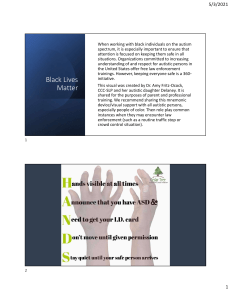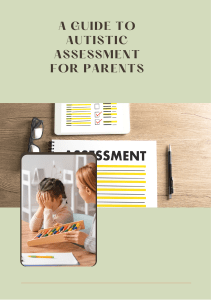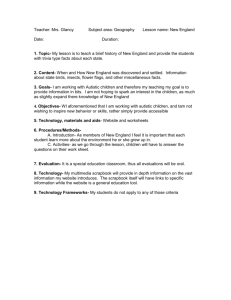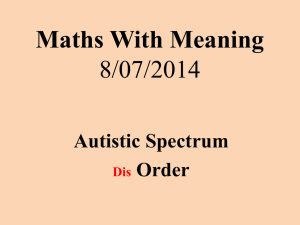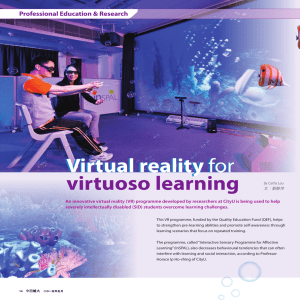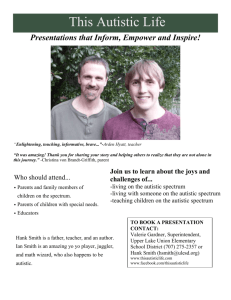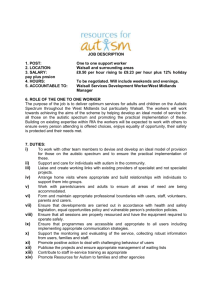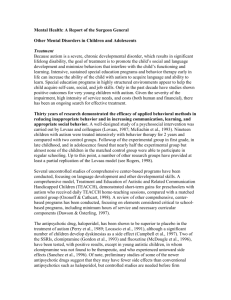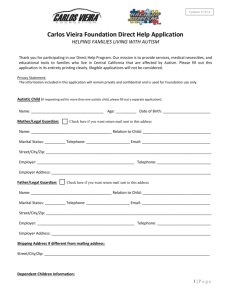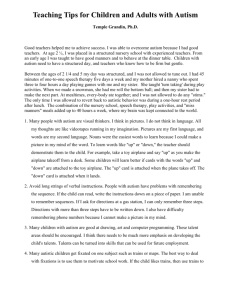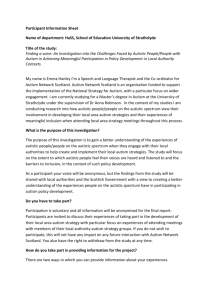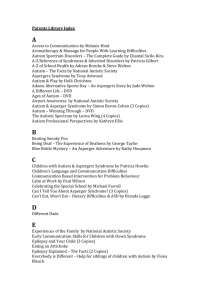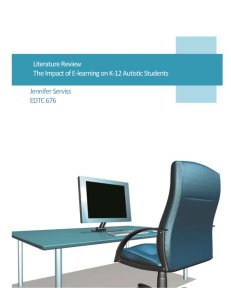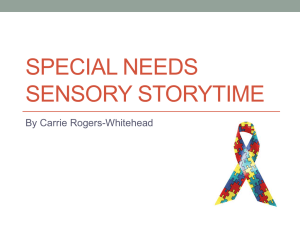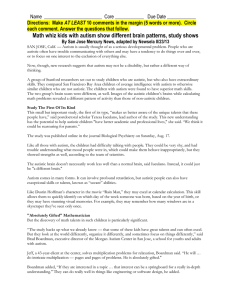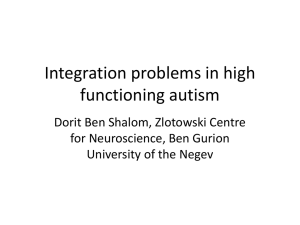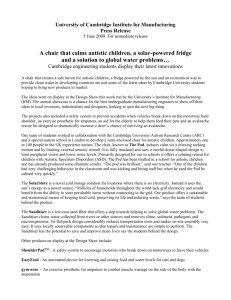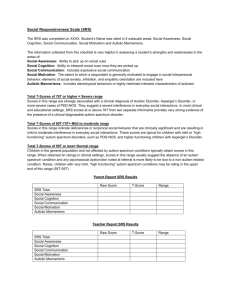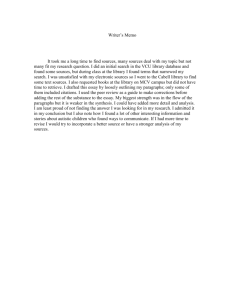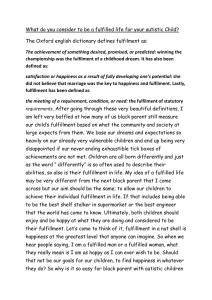TIPS FOR WORKING WITH PEOPLE WHO HAVE AUTISM
advertisement
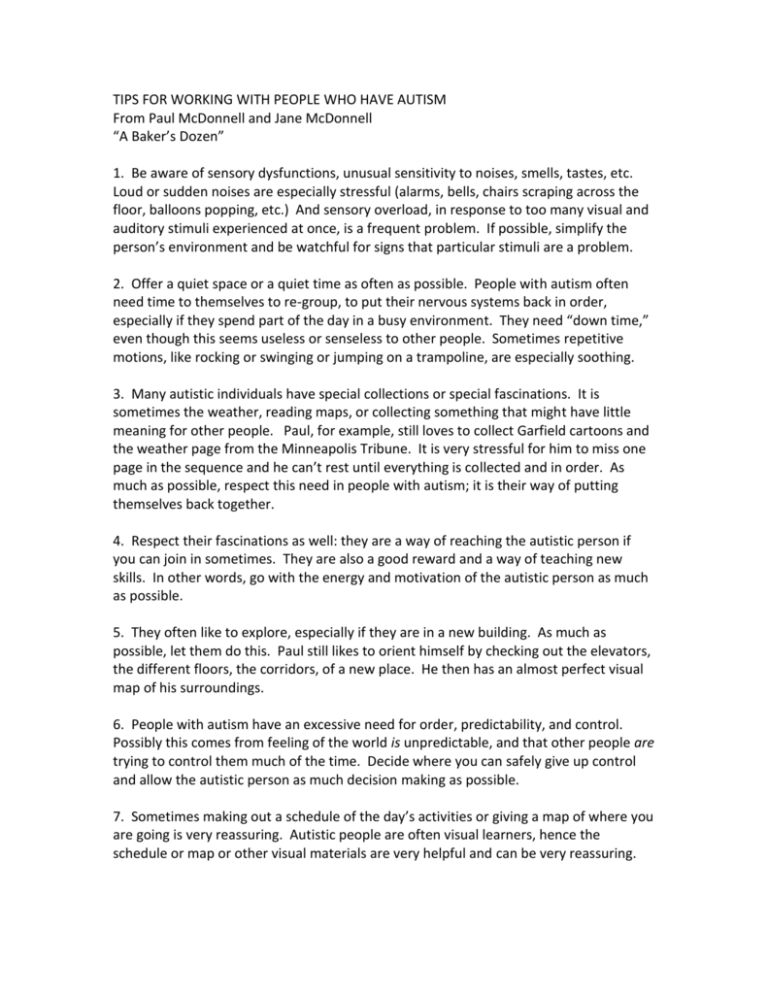
TIPS FOR WORKING WITH PEOPLE WHO HAVE AUTISM From Paul McDonnell and Jane McDonnell “A Baker’s Dozen” 1. Be aware of sensory dysfunctions, unusual sensitivity to noises, smells, tastes, etc. Loud or sudden noises are especially stressful (alarms, bells, chairs scraping across the floor, balloons popping, etc.) And sensory overload, in response to too many visual and auditory stimuli experienced at once, is a frequent problem. If possible, simplify the person’s environment and be watchful for signs that particular stimuli are a problem. 2. Offer a quiet space or a quiet time as often as possible. People with autism often need time to themselves to re-group, to put their nervous systems back in order, especially if they spend part of the day in a busy environment. They need “down time,” even though this seems useless or senseless to other people. Sometimes repetitive motions, like rocking or swinging or jumping on a trampoline, are especially soothing. 3. Many autistic individuals have special collections or special fascinations. It is sometimes the weather, reading maps, or collecting something that might have little meaning for other people. Paul, for example, still loves to collect Garfield cartoons and the weather page from the Minneapolis Tribune. It is very stressful for him to miss one page in the sequence and he can’t rest until everything is collected and in order. As much as possible, respect this need in people with autism; it is their way of putting themselves back together. 4. Respect their fascinations as well: they are a way of reaching the autistic person if you can join in sometimes. They are also a good reward and a way of teaching new skills. In other words, go with the energy and motivation of the autistic person as much as possible. 5. They often like to explore, especially if they are in a new building. As much as possible, let them do this. Paul still likes to orient himself by checking out the elevators, the different floors, the corridors, of a new place. He then has an almost perfect visual map of his surroundings. 6. People with autism have an excessive need for order, predictability, and control. Possibly this comes from feeling of the world is unpredictable, and that other people are trying to control them much of the time. Decide where you can safely give up control and allow the autistic person as much decision making as possible. 7. Sometimes making out a schedule of the day’s activities or giving a map of where you are going is very reassuring. Autistic people are often visual learners, hence the schedule or map or other visual materials are very helpful and can be very reassuring. 8. Don’t expect that they will always follow spoken instructions, especially if these are complicated. Even high functioning people say they can’t keep in mind more than three steps (for example, finding a place). A problem with sequences is a hallmark of autism. 9. Autistic people are often bothered by fluorescent lights. Perhaps they can see the flicker more easily that others; maybe the buzz of the light is especially annoying. Whenever possible put them in a place where there is natural light. Working by a window might be a lot easier that in an enclosed room where there is a buzz and a flicker. My nephew, for example, could not go into a store or a bank where the alarm system was activated. 10. Use a buddy system when you can. Autistic people often have skills that involve numbers or other symbols, maps and a fine sense of direction, money, memory (for phone numbers or dates, for example). If they are paired with someone with social skills, the two of them often learn from each other, as well as compensating for each other’s difficulties. 11. Autism seems to be an extreme “attention deficit” condition. The autistic person has trouble switching attention rapidly and integrating sense impressions from several different sources at once. This is just another reason to simplify the environment, to respect down time, and allow them some repetitive behaviors. 12. More than anything else, build trust. People with autism often have a preternatural sense of the other person’s feelings and they know if they are liked or not. Work on the relationship before anything else. Depersonalize and disengage with autistic behaviors; don’t take them personally or assume the person is being stubborn, willful or malicious. Understand that anxiety can cause extreme over-reactions to what seem like minor issues.
